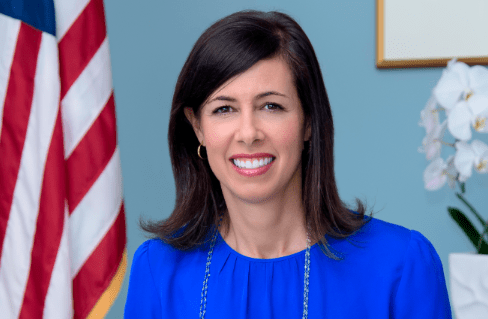Rosenworcel Talks FCC Satellite-to-Cell Regulation in MWC Keynote

Jessica Rosenworcel. Photo: FCC
FCC Chairwoman Jessica Rosenworcel addressed the Commission’s plan to update the regulations related to satellite-to-cell communications at Mobile World Congress in Barcelona on Monday.
“Bringing satellite and terrestrial wireless capabilities together can accomplish what neither network can do on its own,” Rosenworcel said in Barcelona. “We are starting to see how this kind of direct satellite-to-smartphone communication has moved from sci-fi fantasy to real-world prospect.”
She delivered a keynote address after proposing a new regulatory framework last week to support direct satellite-to-smartphone communications. Rosenworcel said Monday that it is designed to facilitate more collaboration between terrestrial mobile network operators and satellite service providers, and she believes it to be the first effort of its kind in the world.
Satellite-to-cell is a major topic in the satellite industry as telcos and device and chip manufacturers like T-Mobile, Apple, and Qualcomm strike deals with satellite operators to provide satellite-to-cell service.
“For this innovation to have a chance to deliver at scale — and to deliver with more providers, in more spectrum bands, and with a global footprint — I believe regulators will need to develop frameworks that support its development. After all, not everyone will have all the pieces to make this work. Some business and technology models will require new and different regulatory approvals before they can get off the ground,” Rosenworcel said in Barcelona, according to a transcript.
She said an ad-hoc, case-by-case approach to this type of communication is not enough to deal with challenges like access to airwaves, frequencies, and interference.
“Our approach will make it easier for satellite operators collaborating with terrestrial mobile providers to obtain authorization for converged services. We also consider what steps we need to take to protect spectrum rights and avoid harmful interference,” Rosenworcel said. “We have an opportunity to bring our spectrum policies into the future and think about how we move past the binary choices between mobile spectrum or satellite spectrum. In other words, we can reshape the airwave access debates of old and develop new ways to get more out of our spectrum resources.”
The FCC will consider the regulations at its next open meeting set for March 16. The released framework proposes to add a mobile satellite service allocation to a class of terrestrial flexible-use bands that have no primary, federal or non-federal satellite allocations, to allow satellites to provide “supplemental coverage from space” to terrestrial networks — expanding terrestrial networks via satellite. It would also allow a satellite operator with existing part 25 authorization for Non-Geostationary Orbit (NGSO) satellite operation to apply to modify their authorization and access terrestrial spectrum.